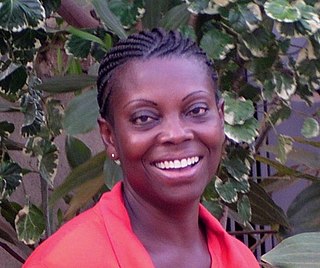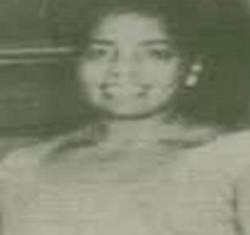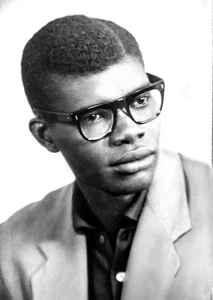Related Research Articles

The University of Ghana is a public university located in Accra, Ghana. It is the oldest public university in the country.

Joseph Kwame Kyeretwie Boakye Danquah was a Ghanaian politician, scholar, anglophile, lawyer and statesman. He was a politician in pre and post-colonial Ghana, which was formerly the Gold Coast.

Amma Darko is a Ghanaian novelist. She won The Golden Baobab Prize for one of her novels. She has published seven novels in total.

Achimota School, formerly Prince of Wales College and School at Achimota, later Achimota College, now nicknamed Motown, is a co-educational boarding school located at Achimota in Accra, Greater Accra, Ghana. The school was founded in 1924 by Sir Frederick Gordon Guggisberg, Dr. James Emman Kwegyir Aggrey and the Rev. Alec Garden Fraser. It was formally opened in 1927 by Sir Guggisberg, then Governor of the British Gold Coast colony. Achimota, modelled on the British public school system, was the first mixed-gender school to be established on the Gold Coast.

Joseph Ephraim Casely Hayford,, also known as Ekra-Agyeman, was a prominent Fante Gold Coast journalist, editor, author, lawyer, educator, and politician who supported pan-African nationalism. His 1911 novel Ethiopia Unbound is one of the earliest novels published in English by an African.
Articles related to Ghana include:

Benjamin William Quarteyquaye Quartey-Papafio, was a physician pioneer and politician on the Gold Coast - the first Ghanaian to obtain the medical degree (M.D) and the first to practise as an orthodox-trained physician.
Frank Kobina Parkes was a Ghanaian journalist, broadcaster and poet. He was the author of one book, Songs from the Wilderness, but is widely anthologised and is perhaps best known for his poem "African Heaven", which echoes the title of Carl Van Vechten's controversial 1926 novel Nigger Heaven, and was selected by Langston Hughes for inclusion in the groundbreaking anthology of African writing An African Treasury (1960). Parkes' poetic style, an intelligent, rhythmic free verse brimming with confidence and undercut with humour, is believed to owe much to the Senegalese poet David Diop, one of the pioneers of the négritude movement. Reviewing Songs from the Wilderness, Mbella Sonne Dipoko said: "Mr Parkes is one of the fine poets writing today about Africa and the world." The book was hailed as "...a landmark not only in Ghanaian poetry but in African poetry as a whole".
The following is a timeline of the history of the city of Accra, Ghana.

Juliet Yaa Asantewa Asante is a Ghanaian film actress, producer and director, and philanthropist. She is currently the Chief Executive Officer (CEO) of the National Film Authority (NFA). Her latest film, Silver Rain, was nominated for "Best Film in West Africa" and "Best costume" for 2015 in the Africa Magic viewer's choice awards (AMVCA) and also 2015 "Best Overall Film In Africa". In 1999, Asante started the production house Eagle House Productions. That same year she also started "Save Our Women International", a non-profit entity focusing on female sexual education and launched an innovation that makes short movies for the mobile phone in Africa in 2014 called Mobile Flicks. She is also the Founder and executive director of Black Star International Film Festival. Eagle Productions has helped train some actors and actresses in Ghana through its training arm, the Eagle Drama Workshop.
Christian Tsui Hesse, popularly known as Chris Hesse is a Ghanaian cinematographer, filmmaker, film administrator, photographer and Presbyterian minister who is known for his cinematography in several award-winning films such as the critically acclaimed Love Brewed in the African Pot (1980) and Heritage Africa (1989). He was the personal cinematographer of Ghana's first President, Dr Kwame Nkrumah. Chris Hesse helped to document the visual history of the political leadership and development of the country. He also worked for the United Nations, serving as a photographer, documenting the Congo crisis in 1960.

Susan Barbara Gyankorama Ofori-Atta, also de Graft-Johnson was a Ghanaian medical doctor who was the first female doctor on the Gold Coast. She was the first Ghanaian woman and fourth West African woman to earn a university degree. Ofori-Atta was also the third West African woman to become a physician after the Nigerians Agnes Yewande Savage (1929) and Elizabeth Abimbola Awoliyi (1938). In 1933, Sierra Leonean political activist and higher education pioneer, Edna Elliot-Horton became the second West African woman university graduate and the first to earn a bachelor's degree in the liberal arts. Eventually Ofori-Atta became a medical officer-in-charge at the Kumasi Hospital, and later, she assumed in charge of the Princess Louise Hospital for Women. Her contemporary was Matilda J. Clerk, the second Ghanaian woman and fourth West African woman to become a physician, who was also educated at Achimota and Edinburgh. Ofori-Atta was made an Honorary Doctor of Science by the University of Ghana for her work on malnutrition in children, and received the Royal Cross from Pope John Paul II when he visited Ghana in 1980, in recognition of her offering of free medical services at her clinic. She helped to establish the Women's Society for Public Affairs and was a Foundation Fellow of the Ghana Academy of Arts and Sciences. Her achievements were a symbol of inspiration to aspiring women physicians in Ghana.

Cinema of Ghana also known as the Ghana Film Industry nicknamed Ghallywood, began when early film making was first introduced to the British colony of Gold Coast in 1923. At the time only affluent people could see the films, especially the colonial master of Gold Coast. In the 1950s, film making in Ghana began to increase. Cinemas were the primary venue for watching films until home video became more popular. The movie industry has no official name as yet since consultations and engagements with stakeholders has been ongoing when a petition was sent to the Ministry of Tourism, Arts and Culture which suspended the use of the name Black Star Films.

MatildaJohannaClerk was a medical pioneer and a science educator on the Gold Coast and later in Ghana as well as the second Ghanaian woman to become an orthodox medicine-trained physician. The first woman in Ghana and West Africa to attend graduate school and earn a postgraduate diploma, Clerk was also the first Ghanaian woman in any field to be awarded an academic merit scholarship for university education abroad. M. J. Clerk was the fourth West African woman to become a physician after Nigerians, Agnes Yewande Savage (1929), the first West African woman medical doctor and Elizabeth Abimbola Awoliyi (1938) in addition to Susan de Graft-Johnson, née Ofori-Atta (1947), Ghana's first woman physician. These pioneering physicians were all early advocates of maternal health, paediatric care and public health in the sub-region. For a long time after independence in 1957, Clerk and Ofori-Atta were the only two women doctors in Ghana. By breaking the glass ceiling in medicine and other institutional barriers to healthcare delivery, they were an inspiration to a generation of post-colonial Ghanaian and West African female doctors at a time the field was still a male monopoly and when the vast majority of women worldwide had very limited access to biomedicine and higher education. Pundits in the male-dominated medical community in that era described Matilda J. Clerk as "the beacon of emancipation of Ghanaian womanhood."
Gold Coast Euro-Africans were a historical demographic based in coastal urban settlements in colonial Ghana, that arose from unions between European men and African women from the late 15th century – the decade between 1471 and 1482, until the mid-20th century, circa 1957, when Ghana attained its independence. In this period, different geographic areas of the Gold Coast were politically controlled at various times by the Portuguese, Germans, Swedes, Danes, Dutch and the British. There are also records of merchants of other European nationalities such as the Spaniards, French, Italians and Irish, operating along the coast, in addition to American sailors and traders from New York, Massachusetts and Rhode Island. Euro-Africans were influential in intellectual, technocratic, artisanal, commercial and public life in general, actively participating in multiple fields of scholarly and civic importance. Scholars have referred to this Euro-African population of the Gold Coast as "mulattos", "mulatofoi" and "owulai" among other descriptions. The term, owula conveys contemporary notions of "gentlemanliness, learning and urbanity" or "a salaried big man" in the Ga language. The cross-cultural interactions between Europeans and Africans were mercantile-driven and an avenue to boost social capital for economic and political gain i.e. "wealth and power". The growth and development of Christianity during the colonial period also instituted motifs of modernity vis-à-vis Euro-African identity. This model created a spectrum of practices, ranging from a full celebration of native African customs to a total embrace and acculturation of European culture.

Ellis Ayitey Komey was a Ghanaian writer and poet.
Ernest Kofi Abbeyquaye also known as Ernest Abbeyquaye, is a Ghanaian filmmaker. He was a filmmaker, producer, and director for the Ghana Film Industry Corporation (GFIC).
Egbert Adjesu is a Ghanaian screenwriter and director best known for the 1970 film I Told You So, released in the post-colonial era.
Tom Ribeiro is a Ghanaian writer and director. He wrote and directed several Ghanaian movies made in the post-colonial era, mainly under the production rights of the Ghana Film Industry Corporation (GFIC), which was set up by Osagyefo Dr Kwame Nkrumah. These movies included Genesis Chapter X (1977), Dede (1992), Set on Edge (1999) The Visitor (1983), Out of Sight, Out of Love (1983), Rituals of Fire and The Village Court.
References
- 1 2 Raph Uwechue (1991). Africa Who's who. Africa Journal Limited. p. 220. ISBN 978-0-903274-17-3.
- ↑ "Aryeetey, Sam, 1927- - LC Linked Data Service: Authorities and Vocabularies | Library of Congress". id.loc.gov. Retrieved 2019-11-17.
- ↑ Ian Aitken (2016). Colonial Documentary Film in South and South-East Asia. Edinburgh University Press. p. 59. ISBN 978-1-4744-0721-2.
- 1 2 Carmela Garritano (15 February 2013). African Video Movies and Global Desires: A Ghanaian History. Ohio University Press. pp. 48–. ISBN 978-0-89680-484-5.
- ↑ Tom Rice, Gold Coast Film Unit, ‘’Colonial Film: Moving Images of the British Empire’’, June 2010.
- ↑ Ghana Year Book, 1978, p.245.